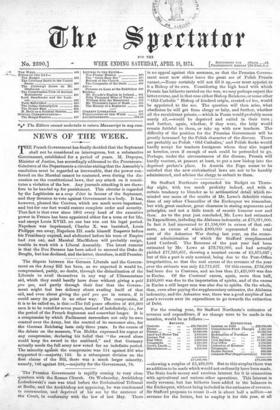The Prussian Government is rapidly coming to very close quarters
with the Roman Church. On Wednesday, Archbishop Ledochowski's case was tried before the Ecclesiastical Tribunal at Berlin, and the Archbishop not appealing, he was condemned in contumaciam, and deprived of his see by the sentence of the Court, in conformity with the law of last May. There is no appeal against this sentence, so that the Prussian Govern- ment must now either leave the great see of Polish Prussia vacant,—Rome certainly will not fill it up,—or must appoint to it a Bishop of its own. Considering the high hand with which Prussia has hitherto carried on the war, we may perhaps expect the latter course, and in that case either Bishop Reinkens, or some other " Old-Catholic " Bishop of kindred origin, created ad hoc, would be appointed to the see. The question will then arise, what obedience he will get from clergy or laity, and further, whether all the recalcitrant priests,—which in Posen would probably mean nearly all,—would be deprived and exiled in their turn ; and further, again, whether, if they were, the laity would remain faithful to them, or take up with new teachers. The difficulty of the position for the Prussian Government will be greatly increased by the Polish character of the diocese. There are probably no Polish Old Catholics,' and Polish flocks would hardly accept for teachers foreigners whom they also regard as heretics, even if enough of such could be persuaded to go. Perhaps, under the circumstances of the diocese, Prussia will hardly venture, at present at least, to put a new bishop into the deprived prelate's place. In Austria the Pope seems to be satisfied that the new ecclesiastical laws are not to be harshly administered, and advises the clergy to submit to them.


































